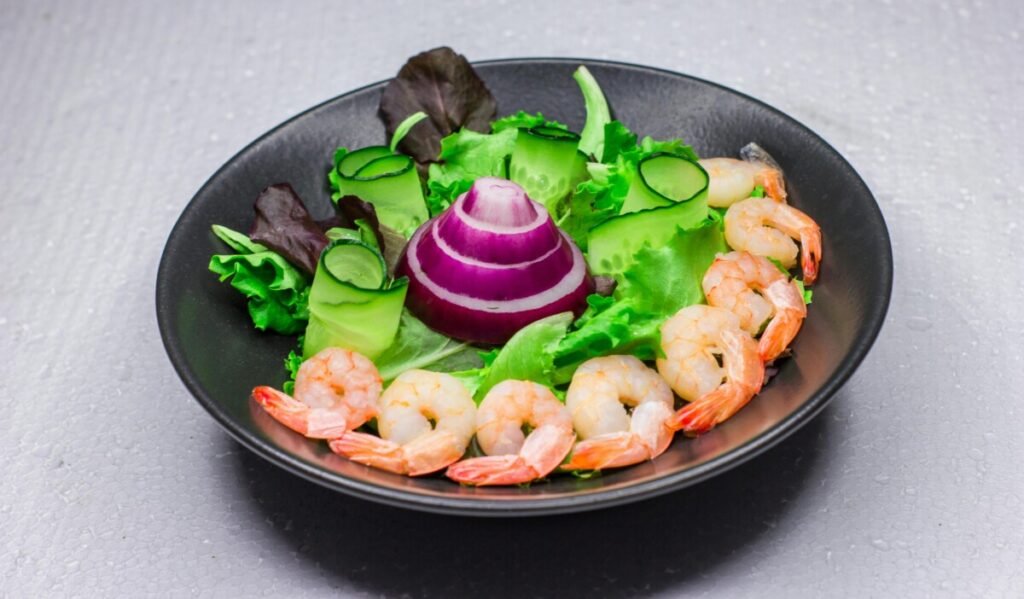Nutritional Benefits of Eating Shrimp

Shrimp is a seafood delicacy that is both delicious and nutritious. Not only is it low in fat and calories, but it is also loaded with essential nutrients that offer numerous health benefits. From weight loss to heart health, shrimp has been proven to provide a wide range of surprising nutritional benefits. In this blog post, we will discuss the top nutritional benefits of eating shrimp that you need to know, as well as its eco-friendly impact. So get ready to discover why shrimp is more than just a tasty treat. It’s also a superfood for your body and the planet.
The Importance of Shrimp in a Nutritious Diet:
Shrimp is a highly nutritious food that offers a range of health benefits. It is an excellent source of high-quality protein, which is essential for building and repairing tissues in the body. Shrimp is also low in fat and carbohydrates, making it a popular choice for those on a low-calorie diet. In addition to protein, shrimp is rich in a variety of vitamins and minerals that are important for overall health, including vitamin D, vitamin B12, and selenium. These nutrients play important roles in brain function, immune system function, and bone health, among other things.
Shrimp is also a great source of omega-3 fatty acids, which are important for heart health. These healthy fats can help to reduce inflammation, lower blood pressure, and improve overall heart health. Consuming shrimp regularly may even help to reduce the risk of heart disease. Overall, incorporating shrimp into your diet can be a great way to boost your overall health and nutrition.
Shrimp: A Low-Calorie Protein Source for Weight Loss
Shrimp is an excellent low-calorie source of protein, making it a popular choice for those looking to lose weight. In fact, a 3-ounce serving of shrimp contains only about 84 calories, while also providing around 20 grams of protein.
Aside from being low in calories, the protein in shrimp is also incredibly filling, which can help to reduce overall calorie intake. Plus, the protein can also help to boost metabolism, allowing your body to burn calories more efficiently. When planning your meals for weight loss, shrimp is a great option to add to your diet. You can enjoy it in a delicious shrimp cocktail, grilled on skewers, or added to a salad for a satisfying and nutritious meal.
Shrimp: Rich in Omega-3 Fatty Acids for Heart Health
One of the key nutritional benefits of shrimp is its high omega-3 fatty acid content. Omega-3s are a type of “good” fat that is important for heart health.
Research has found that consuming omega-3s can help to:
Lower blood pressure
Reduce inflammation
Improve cholesterol levels by increasing HDL (good) cholesterol and decreasing LDL (bad) cholesterol
Prevent blood clots
Improve arterial health
Omega-3s have also been linked to a reduced risk of heart disease, which is the leading cause of death worldwide.
Shrimp is an excellent source of two types of omega-3s: eicosapentaenoic acid (EPA) and docosahexaenoic acid (DHA). These are the same types of omega-3s found in fatty fish like salmon, tuna, and mackerel.
One 3-ounce serving of shrimp contains around 450 milligrams of EPA and DHA, which is about one-third of the daily recommendation for healthy adults. Overall, incorporating shrimp into your diet can be a great way to increase your intake of heart-healthy omega-3 fatty acids.
The Crucial Role of Shrimp in Thyroid Function
Shrimp is loaded with iodine, a mineral that is crucial for healthy thyroid function. The thyroid gland needs iodine to make two important hormones called thyroxine (T4) and triiodothyronine (T3). These hormones regulate the body’s metabolism, which affects almost every organ and tissue in the body, including the heart, brain, muscles, and bones.
Without enough iodine, the thyroid gland cannot produce enough thyroid hormone, which can lead to a variety of health problems, including goiter, hypothyroidism, and cognitive impairment in children. In pregnant women, severe iodine deficiency can even cause stillbirth or miscarriage. Adding shrimp to your diet is an easy and delicious way to ensure that you are getting enough iodine to support thyroid health. In fact, a 3-ounce serving of shrimp can provide up to 23% of the daily recommended intake of iodine for adults.
Shrimp: Boosting Brain Power and Cognitive Health
Did you know that eating shrimp can help to improve brain function and cognitive health? The nutrients found in shrimp, including vitamin B12 and choline, have been shown to have a positive impact on brain health. Vitamin B12 is essential for the formation of healthy red blood cells and the production of myelin, a substance that insulates and protects nerve fibers in the brain. Without enough vitamin B12, the brain can experience a decline in cognitive function and memory. Choline, on the other hand, plays a crucial role in the development and maintenance of healthy brain cells. Studies have shown that a deficiency in choline can result in memory loss and cognitive decline.

In addition to vitamin B12 and choline, shrimp is also rich in other brain-boosting nutrients like omega-3 fatty acids and antioxidants. Regular consumption of shrimp may even help to reduce the risk of age-related cognitive decline. So the next time you’re looking for a delicious and nutritious way to support your brain health, consider adding some shrimp to your diet!
Shrimp: A Good Source of Selenium for Immunity
Selenium is a mineral that plays a crucial role in immune system function, and shrimp is an excellent source of this important nutrient. Getting enough selenium in your diet can help to protect against oxidative stress, reduce inflammation, and improve overall immune system function. Studies have shown that selenium can also help to reduce the risk of certain types of cancer and other chronic diseases, making it an important nutrient for overall health and well-being.
In addition to its immune-boosting benefits, shrimp is also low in calories and fat, making it a great choice for those who are looking to maintain a healthy weight. Plus, it is a great source of high-quality protein and a variety of other essential vitamins and minerals. If you are looking to support your immune system and improve your overall health, adding shrimp to your diet is a great way to do so. Just be sure to choose sustainably sourced shrimp and enjoy it in moderation as part of a well-rounded, nutritious diet.
The Surprising Anti-Inflammatory Benefits of Eating Shrimp
Shrimp isn’t just a delicious seafood option. It also offers a variety of surprising anti-inflammatory benefits that can improve your overall health. One of the key anti-inflammatory compounds found in shrimp is astaxanthin, which has been shown to reduce inflammation throughout the body. Astaxanthin is a type of carotenoid, which is the pigment that gives shrimp their distinctive pink color.
In addition to astaxanthin, shrimp also contains quercetin, another powerful anti-inflammatory compound. Quercetin has been shown to reduce inflammation in the body. Which can help to reduce the risk of chronic diseases. Regular consumption of shrimp may also help to improve joint health and reduce the risk of arthritis. Shrimp is low in fat and cholesterol, which can help to reduce inflammation in the body.
If you’re looking for a delicious and nutritious way to improve your overall health and well-being, consider adding more shrimp to your diet. Whether grilled, boiled, or sautéed. Shrimp is a versatile and tasty seafood option that offers a variety of health benefits.
Shrimp: An Eco-Friendly Seafood Option for a Sustainable Future

As consumers become more conscious of their impact on the environment, it’s important to consider the sustainability of your food choices. Fortunately, shrimp is a seafood option that is often seen as eco-friendly and sustainable.
One reason for this is that shrimp farming is typically more sustainable and eco-friendly than many other types of animal farming. This is because it often involves less land use, water use, and greenhouse gas emissions. Additionally, shrimp farming practices have improved over the years, with many farmers now implementing sustainable methods to reduce waste and the use of harmful chemicals.
However, it’s important to note that not all shrimp farming operations are created equal. Some farms may still engage in harmful practices that can harm both the environment and the shrimp themselves. To ensure that you are choosing a sustainable option, look for labels like the Marine Stewardship Council (MSC) or Aquaculture Stewardship Council (ASC). Which certifies that the shrimp was sustainably farmed or sourced from a sustainable fishery.
By making a conscious effort to choose sustainably sourced shrimp, you can help to support a healthier planet and a more sustainable future while still enjoying the many nutritional benefits of this delicious seafood.
Conclusion
Shrimp is not only a delicious seafood option, but it also offers numerous nutritional benefits that can improve your overall health. From being a low-calorie protein source for weight loss to improving heart health, brain function, and immunity. Eating shrimp is an easy way to support your body’s needs. It’s also a sustainable seafood option, making it a great choice for those who are environmentally conscious. So, consider adding shrimp to your diet and reaping the many surprising nutritional benefits it has to offer. Just be sure to choose sustainable sources and prepare it in a healthy way. Such as grilled or baked, for optimal health benefits.
https://holisticwellnesswave.com/index.php/2024/03/21/mediterranean-grilled-fish/
https://www.fda.gov/
FAQs
Q: What are the nutritional benefits of eating shrimp?
A: Shrimp is high in protein, low in calories, and a good source of essential nutrients like selenium, vitamin B12, and omega-3 fatty acids which contribute to overall health.
Q: Is shrimp considered healthy for consumption?
A: Yes, shrimp is a healthy food choice as it is low in saturated fat and calories, making it a nutritious option for those looking to maintain a balanced diet.
Q: Does shrimp contain high levels of cholesterol?
A: Shrimp does contain dietary cholesterol, but it is low in saturated fat which makes it a suitable choice for most individuals, including those concerned about their cholesterol intake.
Q: What are the health benefits of consuming shrimp?
A: Shrimp provides various health benefits including supporting heart health, aiding in weight management, and promoting muscle growth due to its high protein content.
Q: Can people allergic to shrimp still enjoy its health benefits?
A: Individuals allergic to shrimp should avoid consuming it to prevent allergic reactions. There are alternative sources of protein and nutrients that can be included in their diet.








